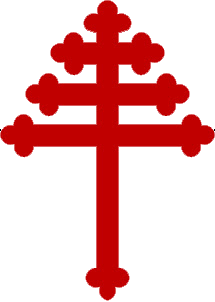Qadich Qadichat قديش قديشت
ܩܰܕܺܝܫ ܩܰܕܺܝܫܰܬ ܩܰܕܺܝܫ ܒܟܽܠܥܶܕܳܢ
قدّوسٌ قدّوسٌ أنتَ قدّوسٌ دائمًا Holy, holy, you are always holy Saint, saint, tu es toujours saint Qadish Qadishat Qadish b’khol’idanܐܰܠܳܗܳܐ ܡܫܰܒܚܳܐ ܡ̇ܩܰܕܶܫ ܠܩܰܕܺܝ̈ܫܶܐ
أيّها الإلهُ المُمجَّدُ مُقَدِّسُ القدّيسين O God, the glorified, the sanctifier of the saints Ô Dieu, le glorifié, le sanctificateur des saints Alaho mshabkho mqadesh l’qaddisheܕܡܶܢ ܣܪ̈ܳܦܶܐ ܕܢܽܘܪܳܐ ܒܪܰܘܳܡܳܐ ܡ݀ܶܬܩܰܕܰܫ
يا مَن، مِن سرافينَ النار، تُقَدَّس في العلاء You who are sanctified by the fiery seraphim on high Toi qui es sanctifié par les séraphins de feu en haut dmén sráfe dnowra b’romá metqadeshܘܡܶܢ ܟܪ̈ܽܘܒܶܐ ܕܚܺܝ̈ܠܶܐ ܒܗܶܕܪܳܐ ܡ݀ܶܬܒܰܪܰܟ
ومن الكروبينَ المُخيفِين تُبارَكُ بأُبَّهَة And from the terrifying cherubim, you are blessed in splendor Et des chérubins terrifiants, tu es béni dans la splendeur wmén kruvé d’hile b’hedra metbarakhܩܰܕܺܝܫ ܩܰܕܺܝܫܰܬ ܡܳܪܝܳܐ ܚܰܝܠܬܳܢܳܐ
قدّوسٌ قدّوسٌ أنتَ أيُّها الربُّ القويّ Holy, holy, you are the mighty Lord Saint, saint, tu es le Seigneur puissant Qadish Qadishat moryo hayltanaܣܓܺܝܕܳܐ ܕܡ݀ܶܫܬܰܒܰܚ ܡܶܢ ܚܰܝ̈ܠܰܘܳܬܳܐ
المسجودُ له الّذي يُمَجَّدُ من القوَّات The one worshiped and glorified by the hosts L’adoré et glorifié par les armées Sghida d’meshtabakh men haylowtaܘܩܽܘ̈ܕܫܶܐ ܬܠܺܝ̈ܬܳܝܶܐ ܠܳܥ̇ܙܺܝܢ ܘܠܳܐ ܫ݀ܳܠܶܝܢ
وتقديساتٍ ثالوثيّةً يُدَندِنُون بدونِ توقُّف And trinitarian sanctifications they intone ceaselessly Et des sanctifications trinitaires ils entonnent sans cesse wqudshe tlytaye l’azin w’la shalinܘܰܨܒ̣ܳܐ ܕܢܶܫ̣ܬܰܒܰܚ ܒܰܐܪܥܳܐ ܡܶܢ ܐ̱ܢܳܫ̈ܳܐ
وقد شاءَ أن يسبِّحَهُ البشَرُ على الأرض And desired that humans praise Him on earth Et a souhaité que les humains Le louent sur terre wtsaba d’neshtabakh b’ara men nashaܩܰܕܺܝܫ ܩܰܕܺܝܫܰܬ ܚܰܝܳܐ ܕܠܳܐ ܡܳ݀ܐܶܬ
قدّوسٌ قدّوسٌ أنتَ أيُّها الحيُّ الّذي لا يمُوت Holy, holy, you are the living who does not die Saint, saint, tu es le vivant qui ne meurt pas Qadish Qadishat khaya d’la mayetܘܰܟܝܳܢܶܗ ܡܥܰܠܰܝ ܡܶܢ ܚܰܫܳܐ ܘܡܰܘܬܳܐ
وطبعُهُ أعلى من الألَمِ والموت And His nature is above pain and death Et Sa nature est au-dessus de la douleur et de la mort wkyaneh m’aly men hasha w’mawtaܕܠܰܟܝܳܢܳܐ ܫܺܝܛܳܐ ܕܓܶܢܣܳܐ ܕܐ̱ܢܳܫܽܘܬܰܢ
الّذي، لطبعِ جِنسِ بشريّتِنا، الطبعِ الحقير Who, for our human nature’s base condition, Qui, pour la condition basse de notre nature humaine, dlakyana sheeta d’gensa d’nashutanܝܰܗ̱ܒ̣ ܚܰܝ̈ܶܐ ܒܚܽܘܒܶܗ ܘܣܽܘܓܳܐܐ ܕܛܰܝܒܽܘܬܶܗ
وهَبَ الحياةَ بحبِّهِ وكَثرةِ نعمَتِهِ Gave life with His love and the abundance of His grace A donné la vie avec Son amour et l’abondance de Sa grâce Yahab khaye b’khube w’sughe d’taybeܬܠ̈ܳܬܳܐ ܕܡܶܢ ܥܳܠܰܡ ܒܰܡܬܽܘܡܳܝܽܘܬܳܐ
ثلاثةٌ منذُ البدء بالأزليَّة Three since the beginning in eternity Trois depuis le début dans l’éternité Tlata d’men ‘alam b’metumyutaܚܰܕ ܐܺܝܬܝܳܐ ܓܢܺܝܙܳܐ ܒܰܬܠ̈ܳܬܳܐ ܩܢܽܘ̈ܡܶܐ
جوهرٌ واحدٌ مُحتجِبٌ في ثلاثةِ أقانيم One essence concealed in three persons Une essence cachée en trois personnes Had itya gniza b’tlata qnomaܐ̱ܒܳܐ ܘܰܒܪܳܐ ܘܪܽܘܚܳܐ ܬܠ̈ܳܬܳܐ ܚܰܕ ܐܶܢܽܘܢ
آبٌ وابنٌ وروحٌ ثلاثةٌ في واحِد Father, Son, and Holy Spirit, three in one Père, Fils et Saint Esprit, trois en un Abun w’bra w’ruha tlata hd innunܚܕܳܐ ܐܰܠܳܗܽܘܬܳܐ ܐܶܬܪܰܚ̣ܰܡܝ ܥܠܰܝܢ
ألوهيّةٌ واحِدة، إرحَمْنا One divinity, have mercy on us Une divinité, aie pitié de nous Hadha alohuta etraham ‘alaynܒܰܐܡܺܝܢ ܕܡܰܠܰܐܟ̈ܶܐ ܘܪ̈ܺܝܫܰܝ ܡܰܠܰܐܟ̈ܶܐ
بحَقِّ الملائكَةِ ورؤساءِ الملائكة By the power of the angels and archangels Par le pouvoir des anges et des archanges B’emén d’malakhe w’rishay malakheܩܰܒ̣ܶܠ ܨܠܰܘ̈ܳܬܰܢ ܘܶܐܬܪܰܚ̣ܰܡܝ ܥܠܰܝܢ
إِقبَلْ صلواتِنا وارحَمْنا Accept our prayers and have mercy on us Accepte nos prières et aie pitié de nous Qabel tsalwatan w’etraham ‘alayn